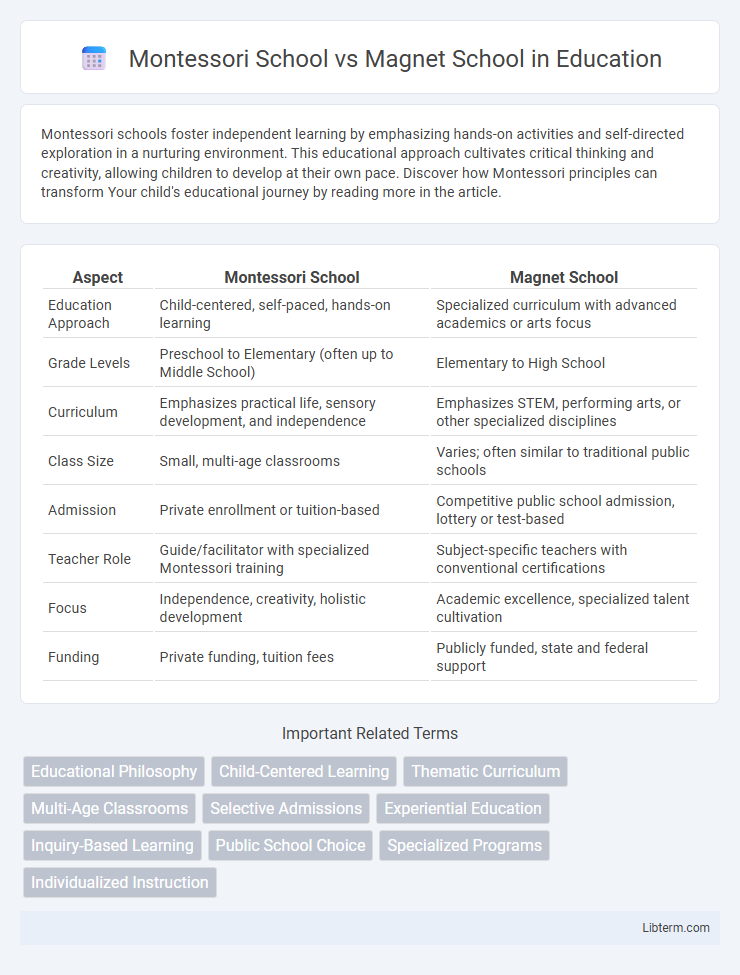Montessori schools foster independent learning by emphasizing hands-on activities and self-directed exploration in a nurturing environment. This educational approach cultivates critical thinking and creativity, allowing children to develop at their own pace. Discover how Montessori principles can transform Your child's educational journey by reading more in the article.
Table of Comparison
| Aspect | Montessori School | Magnet School |
|---|---|---|
| Education Approach | Child-centered, self-paced, hands-on learning | Specialized curriculum with advanced academics or arts focus |
| Grade Levels | Preschool to Elementary (often up to Middle School) | Elementary to High School |
| Curriculum | Emphasizes practical life, sensory development, and independence | Emphasizes STEM, performing arts, or other specialized disciplines |
| Class Size | Small, multi-age classrooms | Varies; often similar to traditional public schools |
| Admission | Private enrollment or tuition-based | Competitive public school admission, lottery or test-based |
| Teacher Role | Guide/facilitator with specialized Montessori training | Subject-specific teachers with conventional certifications |
| Focus | Independence, creativity, holistic development | Academic excellence, specialized talent cultivation |
| Funding | Private funding, tuition fees | Publicly funded, state and federal support |
Introduction to Montessori and Magnet Schools
Montessori schools emphasize child-centered learning with hands-on activities, mixed-age classrooms, and self-directed exploration to foster independence and creativity. Magnet schools, often public and specialized, focus on themes like science, arts, or gifted education, providing rigorous curricula to attract diverse student populations. Both school types aim to enhance personalized learning but employ distinct educational philosophies and structures.
Educational Philosophies Compared
Montessori schools emphasize self-directed learning, hands-on activities, and mixed-age classrooms to foster creativity and independence. Magnet schools offer specialized curricula focused on themes like science, technology, or the arts, aiming to cultivate expertise and academic excellence within a traditional classroom setting. Both educational philosophies prioritize student engagement but differ in structure and instructional approach, with Montessori favoring personalized exploration and magnet schools emphasizing thematic rigor.
Curriculum Structure and Focus
Montessori schools emphasize child-led learning with individualized, hands-on activities that foster independence and creativity, using a fixed curriculum designed to support developmental stages. Magnet schools offer specialized curricula centered around specific themes such as STEM, performing arts, or language immersion, with a structured approach aimed at developing expertise in those areas. The Montessori method prioritizes holistic development through mixed-age classrooms, while magnet schools focus on in-depth knowledge and skill mastery within their specialized fields.
Classroom Environment and Teaching Methods
Montessori schools emphasize a child-centered classroom environment with hands-on, self-directed learning materials that foster independence and sensory exploration. Magnet schools typically offer specialized curricula in STEM, arts, or humanities, creating thematic classrooms that encourage collaborative projects and rigorous academic instruction. Teaching methods in Montessori rely on mixed-age groups and individualized pacing, while magnet schools use standardized lesson plans designed to cultivate specific talents within a highly structured, competitive setting.
Student Assessment and Evaluation
Montessori schools emphasize individualized student assessment through continuous observation, focusing on developmental progress rather than standardized testing. Magnet schools employ a blend of traditional evaluations, including standardized tests and performance-based assessments, to measure academic achievement and specialty program skills. Both prioritize student growth, but Montessori values intrinsic motivation and self-paced learning while magnet schools align assessments with specific thematic curricula and standards.
Admissions Process and Eligibility
Montessori schools typically require early application focusing on developmental readiness and may involve parent interviews, observation sessions, and assessment of a child's sensory and motor skills. Magnet schools often use a competitive admissions process including entrance exams, academic records, and lottery systems to select students based on specific themes like STEM or the arts. Eligibility for Montessori programs centers on age and developmental criteria, while magnet schools prioritize academic achievement and interest aligned with specialized curricula.
Teacher Qualifications and Training
Montessori schools require teachers to complete specialized training and certification in Montessori methods, emphasizing child-centered learning and developmental stages. Magnet school teachers typically hold state teaching credentials and often receive additional training aligned with the school's specialized curriculum or focus area, such as STEM or the arts. The distinct teacher qualifications and training reflect each school's unique educational philosophy and instructional approach.
Benefits of Montessori Schools
Montessori schools provide individualized learning experiences that foster independence, creativity, and critical thinking in children, supporting cognitive and social development through hands-on activities. The mixed-age classrooms encourage peer learning and collaboration, enhancing communication skills and emotional intelligence. Research indicates Montessori students often outperform their peers in standardized tests and exhibit higher levels of intrinsic motivation and problem-solving abilities.
Advantages of Magnet Schools
Magnet schools offer specialized curricula that attract a diverse student body, promoting academic excellence and cultural inclusivity. These schools often provide access to advanced resources, experienced teachers, and unique programs in science, technology, arts, or language immersion, enhancing student engagement and achievement. Magnet schools also prepare students for competitive college admissions by emphasizing critical thinking, collaboration, and real-world skills.
Choosing the Right School for Your Child
Selecting between a Montessori school and a magnet school depends on your child's learning style and interests; Montessori emphasizes self-directed, hands-on learning in a mixed-age environment, fostering independence and creativity. Magnet schools offer specialized curricula, often in STEM, arts, or language immersion, catering to students with specific academic passions or talents. Evaluating your child's needs, whether they thrive in personalized, exploratory settings or goal-oriented, themed programs, ensures the best educational fit.
Montessori School Infographic

 libterm.com
libterm.com